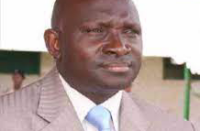Ocampo And Bensouda Are Clowns
It is a sad state of affairs when the International Criminal Court and its behaviour since it was established in 2002 can be described as the “McDonaldization” of justice. It is however a very apt analogy. “McDonaldization” is defined by American sociologist George Ritzer as “the [bureaucratic] process by which principles of the fast-food restaurant are coming to dominate more and more sectors of American society as well as of the rest of the world”. Professor Robert Bohm has written of the “McDonaldization” of justice with regard to American justice.1 His observations apply equally to the ICC.
As Bohm points out, the principal problem with McDonaldized institutions, and another characteristic of the process, is irrationality. Ritzer calls this phenomena the “irrationality of rationality.” Bohm states that McDonaldization does not always benefit all of the participants in the process or society in general and actually has several important costs or dangers associated with it. According to Ritzer, McDonaldized institutions inevitably produce irrationalities “that limit, eventually compromise, and perhaps even undermine their rationality.” They can be inefficient because of excess red tape and other problems. They can produce poor quality work and a decline in employee effort because of the emphasis on quantification (the substitution of quantity for quality and the resulting mediocrity of both the process and the product), the often mind-numbing routine, and the absence of meaningful employee job input. Bohm also states that “McDonaldized institutions can be unpredictable because employees, no matter how well trained and supervised, sometimes are confused, unsure about what they are supposed to do, inefficient, and apt to make mistakes.” Ritzer points out that McDonaldized institutions can also be dehumanising. Ritzer also remarked that Max Weber noted what he called the “iron cage” of rationality in which people get trapped in bureaucracies that deny them their basic humanity2 “as, for example, when crime victims are ignored or mistreated by criminal justice officials”.3
All the above observations about the negative costs of the “McDonaldization” of justice clearly apply to the International Criminal Court.
For all the hope invested in it by those who wished it to be a genuine court of last resort, the ICC the world sees before it is at best a mediocre institution and at worst irretrievably flawed. The court has been inefficient, dysfunctional, selective, unpredictable and racist and has made mistake after mistake. The comment above about criminal justice officials ignoring or mistreating victims is a particular case in point. The ICC promised to be victim-centred yet Human Rights Watch has publicly criticised the ICC’s ambivalence toward victim communities. In 2013 an Avocats Sans Frontieres [Lawyers Without Borders] report stated that the ICC victim registration was “problematic”. The American University’s War Crimes Research Office ICC project has been more candid, stating that “the victim application process is unsustainable” and that the victims are “frustrated”. All these are classic examples of the “McDonaldization” of justice.
The absence of employee job input has also seen the mass departure of good lawyers from the court, leaving lackluster time-servers.
Bohm notes that accepting McJustice is not only supporting the status quo with all of its irrationalities, it is also rejecting viable, especially systemic, alternatives. He concludes: “McJustice, like McDonaldization generally, is a political enterprise in which definitions of rationality and irrationality are contested”, every word of which applies equally to the International Criminal Court, which can all too clearly be seen as little more than a political enterprise directed and funded by the European Union with an exclusive focus on Africa and Africans.
Of one thing there is no doubt. Taking their behaviour and almost laughable ineptitude in office into account, within any “McDonaldization” analogy both of the Chief Prosecutors of the ICC, Ocampo and Bensouda, would easily qualify for the role of the clown, Ronald McDonald.
The International Criminal Court with all its fumbling and bumbling is after all the laughing stock of the judicial world.
Cited sources
1 George Ritzer, The McDonaldization of society, Thousand Pine Forge Press, Oaks, CA, 2004, p. 1. Ritzer points out that the theoretical basis for McDonaldization is Max Weber’s theory of rationality and bureaucracy.
2 Robert M. Bohm, “‘McJustice’: On the McDonaldization of Criminal Justice”, Justice Quarterly, Vol. 23, Issue 1, March 2006, pp. 127-146. Robert M. Bohm is a Professor of Criminal Justice and Legal Studies at the University of Central Florida. He is a past president and Fellow of ACJS as well as a recipient of its Founders Award. His research interests focus on criminal justice, criminological theory, and capital punishment. Bohm points out that the concept of McDonaldization has been used to depict developments in a variety of different social institutions, including religion, education, the media, medicine, and leisure and travel.
3 Ritzer, op. cit., p. 28.
Courtesy of Africa Research Centre
Ends



For those of you who understand french see this youtube video on Ble Goude of Cote d’Ivoire adressing Fatu Bensouda. Very revealing.
https://www.youtube.com/watch?v=dzSg1YChWcc
He is addressing the judges, not Fatou Bensouda.
It takes an awful grimace to swallow most medicines I believe. If he is addressing judges, Mrs. Bensouda is boss in the house of judges……….Isn’t it @ la Manju. Why try twisting that fact around. Who knows after all, the Mcdonaldisation of justice is beyond poor Fatou’s handling.Don’t make it personal! It is an African issue within a global problem. Love this type of articles because they can serve as a note of guidance for you in any public office in the future. eh?
This is a wonderful article. I think our intellectual African citizenry are now ready to turn the page much more serious, for Africa’s future, where, global organisations and dictators will not be adversities in alleviating the continent from bad politicking, poverty, illiteracy,disease, famine and assylum seeking in the west.
I know you like your gran children to visit the west as tourist and not assylum seekers……eh, la Manju?
She is not the boss in that courtroom. The boss is the president of the court who is a judge.
Please la Manju, to serve my enlightenment, I want you to write for me, ”the title” she bears to her office.
The article then must have been mistaken from origin to be headlined with a comical image of Mrs. Bensouda. Who knows Monsieur Ble Goude have yet more addresses like this to hit at his own politicians at home. I think, one like Mrs. Bensouda could have taken Ivory coast in a much better direction than Laurent Gagbo. Monsieur Goude is not directing anything at the Honorable woman in my opinion, other than a sisterly attention.
My only advice hereof, to Monsieur Goude is to refrain himself from all Anglo/Franphone colonial sentiments which has always been another big obstacle in our way, in the general Africa’s debates. One like him will certainly address such sticky colonial mindsets issues in the near future, in the scope of my optimism.
Mrs Bensouda’s title is Chief Prosecutor. Prosecutors are not the boss in a court setting. The Judges are.
This article has a racial undertone. if the prosecutor was a Western Lawyer, you would not have heard anything like this been said especially as devoid of evidence and facts as this. Nothing like this was said of Carla del Ponte, a Swedish Prosecutor at the then UN Tribunal for Yougoslavia.
Thanks Lafia. You sound much more serious this time.